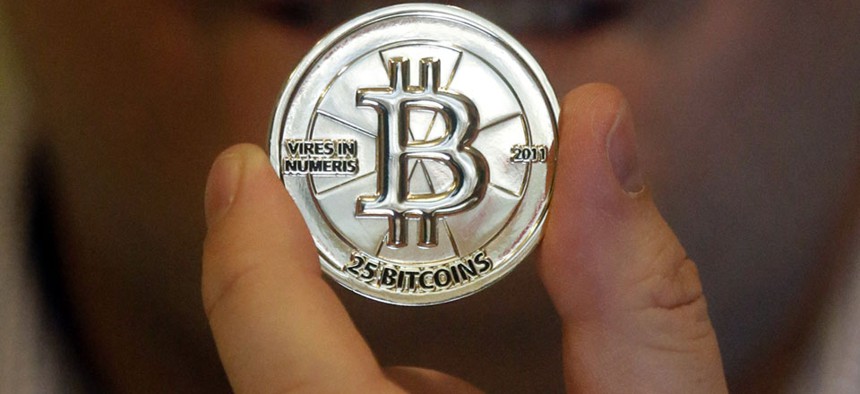The Bitcoin Industry Embraces What It Was Built to Avoid—Rules and Regulation

Rick Bowmer/AP
The crash of the prominent bitcoin exchange Mt. Gox is the latest sign that bitcoin needs to adopt some sort of oversight if it is going to survive and thrive.
Bitcoin was designed to be unregulated by any government or central authority. But according to some of the cryptocurrency’s biggest supporters, the crash of the prominent bitcoin exchange Mt. Gox is the latest sign that bitcoin needs to adopt some sort of oversight if it is going to survive and thrive.
“I think regulation is a must at this point,” said Todd Williams, a stockbroker and Bitcoin investor since 2010. “Maybe not for all businesses working in bitcoin, but for any company or organization that is holding a large amount of other people’s money.”
The Tokyo-based Mt. Gox, which may have lost some $340 million in Bitcoins to hackers, received a subpoena overnight from New York prosecutors, a sign that a US federal investigation is underway. Japanese authorities are also investigating.
A growing number of participants believe the nascent bitcoin industry needs to accept the fact that expanding beyond the fringe comes with some some trappings of accountability.
Compliance, transparency, and insurance
“Nowadays, all bitcoin exchanges are very seriously considering and implementing compliance requirements based on their local jurisdiction’s rules,” said Eddy Travia, chief start-up officer of Seedcoin, a bitcoin company incubator. His firm’s investments include MexBT, a Mexican Bitcoin exchange, where “a large part of the resources…are invested into compliance-related activities,” he said, mostly based on self-imposed rules that are “a kind of self-regulation in anticipation of any potential concerns from the local authorities.”
Bitcoin mining firm DigiMex has showed investors “where funds were invested and spent, at what rate we did the exchange from bitcoin to USD to pay our expenses, all our bank accounts, an inventory of all our mining equipment,” said founder David Shin.
Falcon Global Capital, a bitcoin investment fund launching in March, has promised to store Bitcoins in a digital vault that is “fully-insured by one of the top insurance providers in the world,” though it doesn’t name the firm. It also says it will comply with Securities and Exchange Regulation rules—not for bitcoin, because there aren’t any, but for investment funds.
Mt. Gox was “incompetent, perhaps criminally so,” said Jiten Melwani, CEO of Bitgame Labs, which is developing a payment platform. But just as bitcoin’s underlying algorithms guarantee its security, he said, ”exchanges will be required to mathematically prove their assets and protocols.”
Travia and others say exchanges and companies that exchange bitcoin and traditional money should be required to adhere to publicly-posted rules to protect their users.”There will be a consolidation of efforts to standardize security practices and earn back trust in the industry,” Melwani predicted.
The industry needs “a lot more transparency from the bigger, more liquid exchanges,” added Shin. Many of these exchanges hold Bitcoin and traditional currency floats to manage settlement of buyers and sellers, he said, and “these floats need to be regularly audited and reported.”
Arthur Hayes, a former Citigroup banker who is building BitMex, a bitcoin derivatives exchange, argued that bitcoin first needs to be recognized as a currency, and then transactions can be enforced under existing laws. “Clear and equitable contract law is one of the bedrocks of any financial system,” he said. “Knowing that malicious actions toward your customers could result in criminal and civil charges would change some of the outlaw behavior that currently exists.”
The slow march of regulation and legalization
A bill has been submitted to the California State Senate that would make bitcoin a legal currency. New York state’s financial watchdog has promised to introduce a plan to regulate bitcoin by the end of the year. And Singapore, alone among major economies, has already figured out a way to tax it.
The Irish Bitcoin Association said in January it was asking the local Central Bank to recognize and oversee the currency, to make it safer for consumers. But that’s not to say that there is a unanimous cry from bitcoin advocates to invite in the world’s governments—far from it.
“When has a regulatory agency ever declined the opportunity to put the screws to a new business venture?,” decried Jeffry Tucker, a columnist on Let’s Talk Bitcoin. But that’s just what happened in Canada, he wrote, when the anti-money laundering authority turned down a request for oversight from Quickbit, which allows users to use a debit card to pay for goods in bitcoin. In the US, though, a patchwork of Congressional warnings, financial crimes enforcement threats and interested state regulators is even worse:
It’s so bad that bitcoin advocates themselves are reduced to Stockholm-like begging: “please, regulate us as soon as possible.” They figure that even draconian regulators are better than the current fear-and-loathing environment that has so vexed the crypto-currency community.
This shift towards regulation and accountability is somewhat ironic, given bitcoin’s libertarian origins and fan base—a point not lost on its most vocal critics:
the best part about bitcoins is that you get to watch libertarians slowly discover why financial regulations exist to begin with
— Pocius Pocius (@The_Pocius) February 18, 2014Industry participants say that remaining exchanges and companies will become stronger after Mt. Gox’s failure. “As the saying goes, a ‘smooth sea never made a skillful sailor,’” Travia said.
Reprinted with permission from Quartz. The original story can be found here.
NEXT STORY: IT Reform Act Heads to House Floor Tuesday





